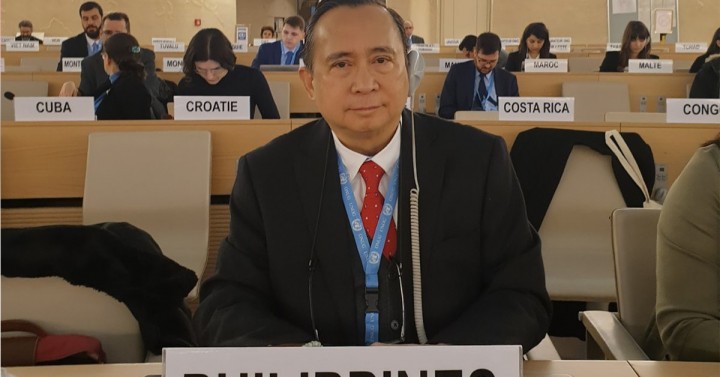News
PH highlights human rights-responsive nat’l programs

Ambassador Evan P. Garcia, Permanent Representative to the UN in Geneva, said the Philippines has been hosting the annual ASEAN Dialogue on the General Comments of the UN Convention on the Rights of the Child, with a view to better implement state obligations in the region and enhance coordination and synergy between the work of UN treaty bodies, human rights mechanisms, and regional human rights bodies on child rights and child protection. (File photo: DFA via PNA)
GENEVA, Switzerland – Highlighting good practices, the Philippines urged the United Nations Human Rights Council (UNHRC) to strengthen work on child protection and advancing the rights to food, adequate housing, privacy, among others.
During the interactive dialogue on March 10 with UN Special Rapporteur on Sale of Children, Maud de Boer-Buiquicchio, the Philippines called attention to the alarming trend of the use of digital technology for exploiting children and violating their rights.
Ambassador Evan P. Garcia, Permanent Representative to the UN in Geneva, said the Philippines has been hosting the annual ASEAN Dialogue on the General Comments of the UN Convention on the Rights of the Child, with a view to better implement state obligations in the region and enhance coordination and synergy between the work of UN treaty bodies, human rights mechanisms, and regional human rights bodies on child rights and child protection.
At the discussion with the Hilal Elver, UN Special Rapporteur on the right to food, Garcia said the eradication of hunger is a top priority for the government and that President Rodrigo Duterte created in January 2020 the Inter-Agency Task Force on Zero Hunger through Executive Order No.
101 to formulate a roadmap for ensuring food security and hunger eradication.
“Under the 2019 Magna Carta of the Poor, government agencies are mandated to spearhead actions to promote food self-sufficiency and strengthen the access by the poor to resources and means to ensure food security,” he said.
He added that the President’s Executive Order No. 75 of 2019 had made available 300,000 hectares of government-owned lands for the agrarian reform program.
Garcia also highlighted the Duterte administration’s BALAI Housing Program in a dialogue with the UN Special Rapporteur on adequate housing, Ms. Leilani Farha.
“BALAI which refers to Building Adequate, Livable, Affordable and Inclusive Filipino communities is a 10-year national strategy to close the country’s housing gap, in concrete support of the attainment of the Filipino dream of home ownership articulated in the planning document Our Ambition 2040,“ he said.
Meanwhile, he also told UN Special Rapporteur on privacy, Joseph Cannataci, that the Philippines cited the Data Privacy Act and the work of the privacy watchdog National Privacy Commission.
“The government fully upholds the right to privacy while at the same time balances this with upholding the public’s right to access information. President Duterte’s Executive Order no. 2 on the Freedom of Information Program mandates public disclosure of all government records involving public interest toward ensuring an open, transparent, and accountable governance that empowers informed citizen participation,“ Garcia said.
The Philippines, a fifth-term member of the Human Rights Council (2019 to 2021), is a staunch advocate of the human rights of vulnerable groups and is recognized as a global leader on many human rights advocacies including on gender and migration.
The Philippines actively contributes to strengthening the work of the Council in promoting and protecting human rights through constructive, meaningful, and effective actions. (DFA)





















